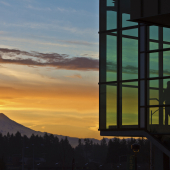Are you wondering if studying in Switzerland is expensive? If you’ll have to wait a long time to get your visa? Let’s clear it up: the visa process is very much similar to other European countries and tuition fees can even be lower. Switzerland is not a cheap country, but your monthly expenditure will depend on your choice between a student residence, a studio or... a castle in the Swiss mountains. Which one are you going for?
1. Switzerland, sweet Switzerland
Known as having the idyllic scenery for Heidi’s novels and for its world-class chocolate, this country located in-between France, Italy and Germany is also a global reference in terms of security and stability levels. Home for remarkable watch-production companies, financial institutions and international organizations – including the United Nations, Red-Cross International Committee and World Trade Organization’s offices and many other multinational companies’ headquarters – Switzerland is a world hub for diplomacy and business.
While living in this green land, you’ll get to hear French, German and Italian, depending on the country you have across the border. This is why Switzerland is normally divided into three linguistic regions: French, German and Italian.
|
The Swiss school SUMAS, Sustainability Management School, sits on the French region, by the immense Lake Geneva, one of the largest inland lakes in Europe. The campus is located in the relaxing city of Gland, halfway between Geneva and Lausanne (about half-hour train away from each), in a region of vineries and alpine mountains. However, all study programs at SUMAS are taught in English. |
2. In your free time
Also by the lake, very close to Gland’s campus, you will find the beautiful city of Nyon, where you can take advantage of a more dynamic and cosmopolitan atmosphere: there are plenty of festivals, shops, clubs and cinemas in Nyon.
Although, Switzerland’s oyster is its nature, and this is something you can enjoy all year round: in the summer, Lake Geneva attracts tourists from all around the world, excited to practice many water sports and hike through the beautiful, flowered hills – just like in Heidi’s tales; in the winter, the Swiss Alps are the perfect paradise for the ski and snowboard lovers, and some of the top-notch ski resorts and stations are set in this region. Likewise, around the Gland area, you’ll find many other distractions available throughout the four seasons, from visits to castles and museums and numerous sports activities and tournaments to practice and watch.
|
At SUMAS, for instance, bus and boat trips to Italian and French tourist spots across the lake and beyond, social meetings and nights out for international students and freshmen, as well as discussion circles on different topics of interest are organized, some of them included in the Student Union’s program, which you will be welcome to join in. |
3. Education in Switzerland
“Excellent reputation!” – this is what you hear from experts and which is widely known... now, why is it worth it to study in Switzerland?
Firstly because, being a business international meeting hub, in the heart of Europe, you can be sure you will be studying in a multicultural environment, getting to learn different languages with French, German and Italian native speakers, as well as with many study exchange students from all around the world.
What about the English language learning? Don’t worry because this is a language you will always have to be listening and practicing: there are several radio stations, cinemas, cultural shows, newspapers and magazines using English as a means of communication.
Then, compare Switzerland’s educational system to its landscape: as diverse as it could be. Higher education in Switzerland is provided by ten Cantonal Universities and two Federal Institutes of Technologies. There are also the career-oriented Universities of Applied Sciences, and other universities focused on teacher education. In terms of a private system, you’ll also find various renowned universities, institutes and international and bilingual schools available to all kinds of students. Note that Swiss educational institutions are frequently ranked among the best in the world, thanks to its diverse offerings and its strong capacity to forecast and adapt to the future’s challenges and demands.
|
The costs of a study program in Switzerland are relatively low compared to other European education systems, but the expenditure may substantially vary depending on the school, on the course level and also on the region you choose to study in Switzerland. The Government offers scholarships to international students, of which you can find more information by contacting the Swiss Embassy in your country. |
4. The student visa
Although Switzerland is not part of the EU, the country territory is included in the Schengen Area, Europe’s space for free circulation of goods and people. This means that your visa process will be similar to other European countries and that, once you’re on its possession, you will be free to travel to other Schengen countries.
The visa requirements depend on one’s nationality – some countries don’t need a student visa for periods up to 90 days but some others do. For periods of more than 3 months, most nationals from outside Europe have to apply for a student visa at the Swiss Embassy in their countries, whether joining a Bachelor’s degree, a Masters, a PhD or even a 6-month program. Normally, this process can take between two to four months until the visa is provided, more or less the same amount of time you would have to wait to get a student visa to another European country.
|
Don’t forget that before you apply for the student visa, you need to be first accepted at your institution, in order to prove that you’re actually going to study in Switzerland. |
5. Living in Switzerland
The housing costs will rely on the type of accommodation you go for, since there are plenty of options to stay: in a hotel room, a student residence, a studio apartment or, imagine, in a palace – of course, not a palace just for you, but a room in one of the Swiss chateaux, mansions located on the region’s big farms and vineries. It’s not a dream: yes, it is possible to stay at one of these wonderful places!
To help you find a place to stay during your study journey in Switzerland, the school will give you a hand on your search. It is recommended that you count on a minimum budget of 1600 CHF for your monthly living expenses, including food and other personal expenses, housing, transportation and health insurance. Remember: Switzerland is not a cheap country, and Zurich and Geneva are often considered some of the most expensive cities in the world, but, like in any good study destination, it will depend on your budget and on your habits.
|
A quick tip that will help you cutting costs: cycling! SUMAS encourages its students to use their vélos for short distances and has a bike station in front of its main building. The so-called “Velopass” system interconnects several bike stations, available 24/7, where you can rent a bike to cycle towards other parts of the city: affordable and environmentally friendly! |










